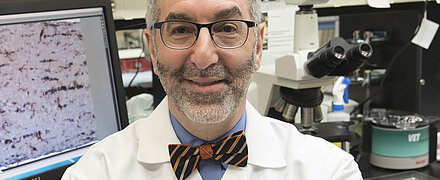At the Max Delbrück Center, Einstein BIH Visiting Fellow David Gutmann wants to understand how immune system-like cells in the brain, called microglia, cause cancer, vision loss, and behavioral problems. Gutmann and his graduate student team in Professor Helmut Kettenmann’s laboratory will perform these studies using both genetically-engineered mice and human skin-derived stem cells that model the Neurofibromatosis type 1 (NF1), a common condition in which children and adults develop brain tumors, vision loss, learning and attention deficits, and autism. David Gutmann received his education at the University of Michigan and the University of Pennsylvania.


